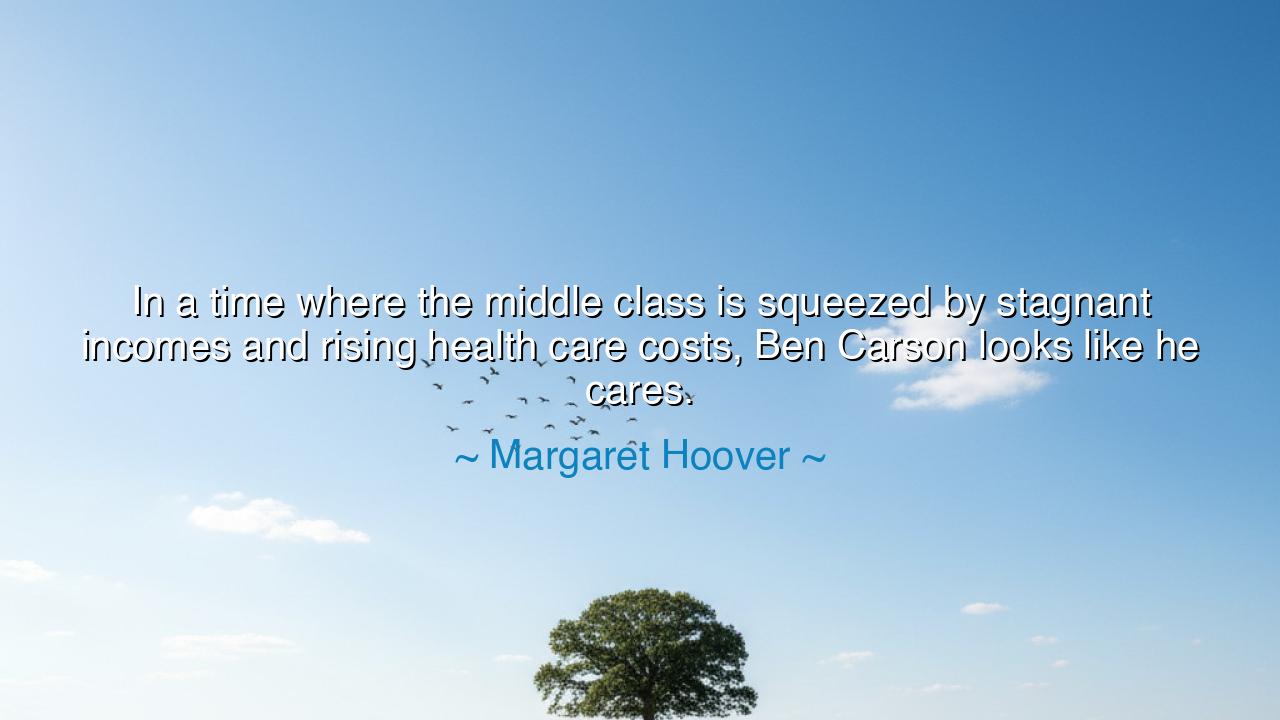
In a time where the middle class is squeezed by stagnant incomes
In a time where the middle class is squeezed by stagnant incomes and rising health care costs, Ben Carson looks like he cares.






The Mask of Compassion in an Age of Strain
Hear the words of Margaret Hoover, political thinker and descendant of statesmen, who spoke with clarity about the struggles of the age: “In a time where the middle class is squeezed by stagnant incomes and rising health care costs, Ben Carson looks like he cares.” Though her words were born in the arena of modern politics, they carry echoes of an older wisdom—the yearning of the people for leaders who not only rule, but feel. In them lies a truth about humanity’s deepest desire: that in times of hardship, people do not seek only strength, but compassion; not only action, but the assurance that those in power see their suffering.
The Meaning of the Teaching
Hoover speaks of a people caught between the weight of economic burden and the rising cost of survival. The middle class—once the stable foundation of nations—finds itself eroded by forces beyond its grasp: inflation, medical debt, and the slow fading of prosperity’s promise. In such a time, the sight of a leader who “looks like he cares” becomes more than political theater—it becomes a lifeline of hope. Her words remind us that perception and empathy in leadership are as vital as policy. A leader may command armies or draft laws, but if the people do not feel seen, his power is hollow. To “look like one cares” is not trivial—it is the first light of trust, the signal that healing may be possible.
The Origin of the Words
Margaret Hoover, the great-granddaughter of President Herbert Hoover, spoke these words in reflection upon Ben Carson, the famed neurosurgeon turned political figure during the 2016 U.S. presidential race. Carson, though new to the political stage, embodied the image of calm sincerity—a man who had risen from hardship, healed others through skill and faith, and spoke softly amid the roar of partisanship. To many weary citizens, he seemed genuine, untouched by the cynicism of power. In that moment, Hoover captured a paradox of democracy: that often, the heart of the people is moved not by rhetoric or policy, but by the presence of perceived compassion.
The Parable of the Two Kings
In the chronicles of old, there is a tale of two kings who reigned in neighboring lands. One ruled with unmatched wisdom, building cities and forging alliances; the other ruled with warmth, walking among his people and tending to their wounds. When famine came, the first king sent orders from his palace, while the second stood among the hungry, sharing their meager bread. Though both sought to save their people, it was the second whom they followed with devotion. For they said, “He suffers with us, and therefore we endure.” This story mirrors Hoover’s observation: that in every era, the heart follows the one who feels, even before it follows the one who acts.
The Burden of the Common People
The middle class, as Hoover describes, is not merely an economic category—it is the pulse of the nation. These are the artisans, teachers, nurses, and builders whose labor sustains civilization. Yet, when their wages stagnate and their health care costs rise, their toil becomes bondage rather than blessing. They seek not charity but fairness, not pity but dignity. And when the powerful forget them, when policy grows distant and bureaucracies cold, they turn toward any figure—like Carson in Hoover’s quote—who seems to care, who speaks with empathy, who recalls that leadership without compassion is tyranny dressed in civility.
The Mirror of Perception and Reality
Hoover’s words also reveal a tension between appearance and substance. To “look like he cares” is not the same as to care, yet perception can shape destiny. Throughout history, leaders who mastered the art of empathy—whether genuine or feigned—have moved nations. Abraham Lincoln’s sorrowful humility bound a wounded country; Emperor Ashoka’s remorse after war turned empire into enlightenment; yet others, cloaked in false compassion, deceived nations into ruin. Thus, the wise must learn discernment—to see through the veil, to seek not the image of care, but the truth of the heart behind it.
The Lesson for the Generations
Therefore, O listener, let this teaching settle upon your heart: compassion is the lifeblood of leadership, yet discernment is the shield of the people. Seek leaders who do not merely “look” kind, but live kindness through action. And if you yourself would lead—whether in a family, a village, or a nation—remember that to care is not to weep before the crowd, but to labor quietly for their good. The one who truly serves does not perform empathy; they practice it daily, unseen, through just deeds and steadfast integrity.
The Eternal Counsel
So let the words of Margaret Hoover echo through time: “In a time where the middle class is squeezed by stagnant incomes and rising health care costs, Ben Carson looks like he cares.” Her observation is not merely political—it is human. It calls each generation to examine both its leaders and itself. For when the people learn to value genuine compassion over spectacle, and when the leaders learn to see beyond power to the pain of their people, then shall governance once again resemble wisdom. And in that harmony—between empathy and truth, between care and courage—the nation shall heal, and the hearts of its people shall find rest.






AAdministratorAdministrator
Welcome, honored guests. Please leave a comment, we will respond soon